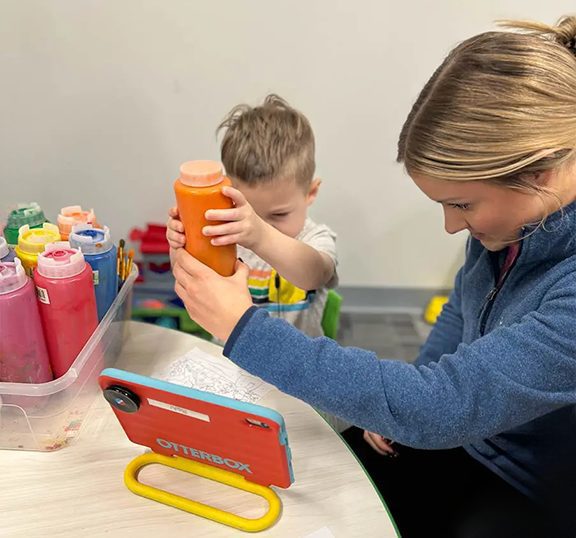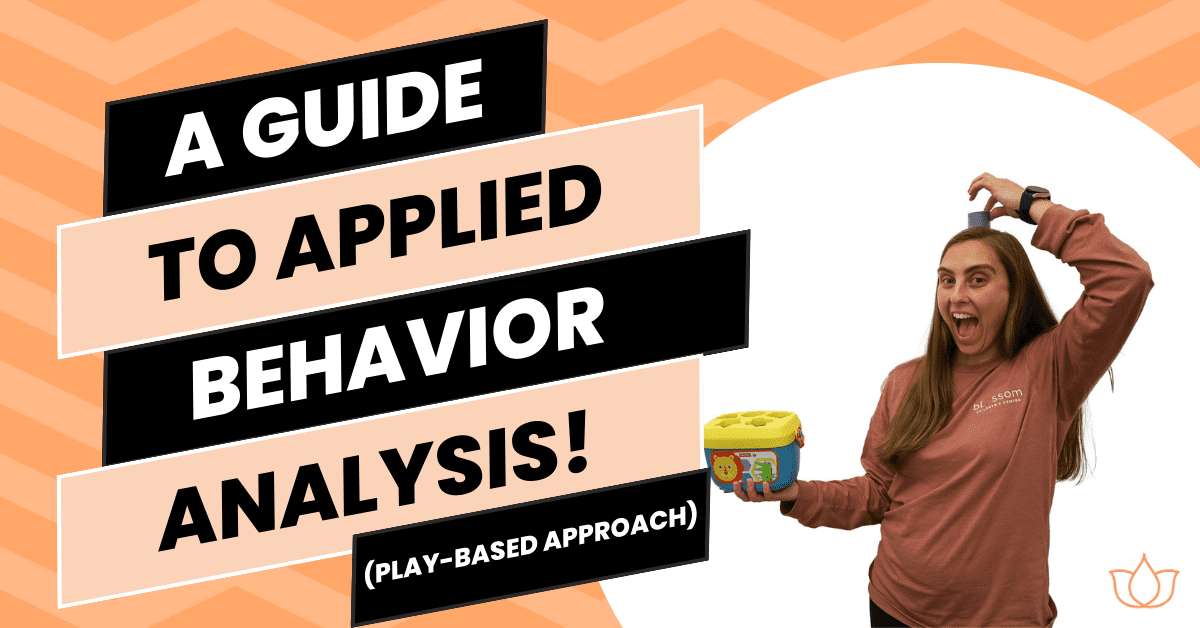
Receiving your child’s autism diagnosis can be overwhelming. Along with the emotional components, you are now facing what seems like an endless list of tasks and research to begin seeking services and additional resources. Searching for a high-quality ABA clinic is vital. Finding the right ABA clinic can be life-changing for your child, as well as your entire family. While you may find several ABA therapy options, selection should be a systematic process to ensure you meet your child’s needs. While scouting for the ABA therapy center that will best fit your family, keep these critical guidelines in mind:
- Employs a highly qualified staff
- Practices a family-centered approach
- Offers an all-encompassing ABA clinic
- Utilizes an effective system for tracking data
- Positive reinforcement techniques are in use

What is ABA Therapy?
ABA therapy, or Applied Behavioral Analysis, is a scientifically validated therapy which provides a clearer understanding of how your child’s environment may be affecting their behaviors. ABA therapy is a widely used behavioral therapy in practice for over five decades. ABA therapy takes an in-depth look at how behavior and learning take place. This form of treatment focuses on using a reward system which is most meaningful to each child individually, to replace undesirable behaviors with a beneficial skill or behavior. ABA therapy provides an in-depth view of your child’s skill set and behaviors in their natural environments and real-life circumstances while determining their strengths and weaknesses. ABA therapy relies heavily on parent participation to help your child form positive, lasting changes while replacing those that could cause harm to your child or interference with their ability to learn. ABA therapy touches many areas, including their:
- Home environment
- School or daycare environment
- Social skills
- Self-care skills
What is Behavioral Therapy
Behavioral therapy offers a well-structured intervention approach and is often where most recently diagnosed children will begin. Along with ABA therapy, behavior therapy will help meet the additional needs of your child by providing:
- Social Skills Groups: Focus is on helping your child develop the skills to engage with others, practice their communication skills, and reinforce new, positive learned behaviors. Your child’s ABA therapy team will guide you to help your child understand and determine which responses are appropriate for various situations.
- Cognitive Behavioral Therapy: For children with mild symptoms, this form of behavioral therapy will help your child choose alternative behaviors. By using the tools they learn, they will begin to determine and utilize more appropriate actions or responses as they learn how to recognize their triggers and reactions.
- Verbal Behavioral Therapy: This form of behavioral therapy helps non-verbal children communicate effectively and with intent. Your child’s ABA therapy team will evaluate and choose a particularly stimulating motivator for your child to help them understand that utilizing language skills will bring desirable outcomes.
A Highly Qualified Team
You must know who will be working with your child, so don’t be afraid to ask questions. Find out what training the ABA clinic’s staff has. What certifications do they hold, and is ongoing training a requirement? Your child and family will have a team of dedicated members, but knowing their education, training, and their requirements for continuous study will ensure you are considering a highly qualified ABA clinic.
The top credential practitioners of ABA therapy are Board Certified Behavior Analysts or BCBAs. This requires rigorous training involving a master’s degree in a relatable field such as behavioral therapy, speech therapy, special education, or psychology. ABA therapy courses, final exams, and 1,500 hours of supervised fieldwork are requirements towards certification.
A Family-Centered Approach
A high-quality ABA clinic will offer a team of clinicians who believe in the power of family involvement. Behavioral therapy is most effective when your child’s team values the need to communicate with your family frequently. As a parent, you are your child’s advocate and can offer crucial insight into their daily routines, behaviors, and what may or may not be working in their natural environments. The right ABA clinic and the team will be willing to train and offer guidance while requiring your participation during specific sessions as well as at home. Choosing an ABA clinic that prioritizes the family-centered approach will bring tremendous benefits, vital to your child’s success.
An All-Encompassing Approach
An all-encompassing approach to providing essential services for your child and family is extremely beneficial. By offering multiple services, including behavioral therapy, physical therapy , and more, your child’s needs can be met all under one roof. The all-encompassing approach to therapy helps ensure all therapists and team members are on the same page, working together towards your child’s individual goals. Rather than running around to independently scheduled therapy sessions at various offices, a center such as Blossom Children’s Center provides your family with the convenience of all therapies in one familiar location.
Tracking Data
Ensure the clinic you are considering practices regular and ongoing data collection. It is a vital part of evaluating the progress your child makes towards goals. Your child’s team bases critical decisions regarding goals and therapy sessions from ongoing data collection. While collecting data during behavioral therapy sessions, they should also stress the importance of your own data collection. As a parent, your natural environment recordings bring light to the improvements or setbacks the team will not witness, allowing them to make any necessary adjustments. Consistent data collection provides the potential to discover why particular behaviors are occurring.

What is Positive Reinforcement?
Positive reinforcement is a form of behavioral therapy management offering one of the most effective interventions for children with behavioral issues and autism. Its use of ABA therapy helps implement a change in maladaptive behavior while strengthening lasting behavioral outcomes. It is an individual reward system using items or privileges your child considers to be profoundly meaningful. Ultimately, the goal of positive reinforcements in behavioral therapy is for personalized rewards to provide enough encouragement to result in a new, positive response. When the new behavior or skill is not successful, the reward is not given. This process repeats as necessary, providing your child the time they need to practice and adapt to their new skills and behaviors.
A more meaningful reinforcer will motivate them to use new skills and behaviors throughout all areas.
Here at the Blossom Children’s Center, we offer a dynamic, all-encompassing approach to ensure your child’s success. Our highly qualified team provides dedication and care by providing your family with the additional services your child needs. We are here to answer your questions, guide you through the process and support you in every way we can. While working with your entire family, our team of trained therapists wants to help you on your journey. Learn more about us and why the Blossom Method is the preferred choice for children with autism and related disorders.












I appreciate it when you mentioned identifying the people who will be working with your special needs child by checking if they have the right credentials to do the job. My friend is looking for a facility for her autism child to learn since she wants him to be independent. I will suggest her to find a reliable clinic that has a professional team that is experienced in handling special needs children.